Difference between revisions of "User:Chipsum"
m (→Peripherals) |
m (→Peripherals) |
||
| Line 36: | Line 36: | ||
! scope="col" style="width:300px"|Note | ! scope="col" style="width:300px"|Note | ||
|- | |- | ||
| − | |[[File: | + | |[[File:NES Zapper.png|200px]] |
!Zapper | !Zapper | ||
|An electronic light gun accessory that allows players to aim at the display and shoot various objects that appear on the screen. | |An electronic light gun accessory that allows players to aim at the display and shoot various objects that appear on the screen. | ||
| Line 71: | Line 71: | ||
|The BIOS file (which can be found [[Emulator_Files#NES_.2F_Famicom|here]]) is required for FDS emulation. Note that there are two versions of the BIOS: one that comes with FDS and another that comes with Sharp's [[Wikipedia:Twin Famicom|Twin Famicom]]. They function identically despite showing a different intro during the first boot. | |The BIOS file (which can be found [[Emulator_Files#NES_.2F_Famicom|here]]) is required for FDS emulation. Note that there are two versions of the BIOS: one that comes with FDS and another that comes with Sharp's [[Wikipedia:Twin Famicom|Twin Famicom]]. They function identically despite showing a different intro during the first boot. | ||
|- | |- | ||
| − | |[[File: | + | |[[File:Famicom Controller Microphone.png|200px]] |
!Microphone | !Microphone | ||
|A Japan-exclusive, built-in feature in the original Player 2 Famicom controller that allows players to use an external sound source (e.g., the player's voice) as input. | |A Japan-exclusive, built-in feature in the original Player 2 Famicom controller that allows players to use an external sound source (e.g., the player's voice) as input. | ||
| Line 78: | Line 78: | ||
|N/A | |N/A | ||
|- | |- | ||
| − | |[[File: | + | |[[File:Family BASIC.png|200px]] |
!Family BASIC | !Family BASIC | ||
|A Japan-exclusive peripheral with an enhanced [[Wikipedia:BASIC|BASIC]] programming language dialect. It allows users to create programs in the Famicom. It has a specially designed cartridge, keyboard, and Data Recorder. | |A Japan-exclusive peripheral with an enhanced [[Wikipedia:BASIC|BASIC]] programming language dialect. It allows users to create programs in the Famicom. It has a specially designed cartridge, keyboard, and Data Recorder. | ||
| Line 85: | Line 85: | ||
|N/A | |N/A | ||
|- | |- | ||
| − | |[[File: | + | |[[File:Famicom Data Recorder.jpg|200px]] |
!Famicom Data Recorder | !Famicom Data Recorder | ||
|A Japan-exclusive compact cassette tape data interface as an addition to the Family BASIC to save data from BASIC programs created by users. | |A Japan-exclusive compact cassette tape data interface as an addition to the Family BASIC to save data from BASIC programs created by users. | ||
| Line 92: | Line 92: | ||
|N/A | |N/A | ||
|- | |- | ||
| − | |[[File: | + | |[[File:Famicom 3D System.jpg|200px]] |
!Famicom 3D System | !Famicom 3D System | ||
|A Japan-exclusive active shutter glasses headset that allowed compatible games to display a stereoscopic image for a 3D experience. | |A Japan-exclusive active shutter glasses headset that allowed compatible games to display a stereoscopic image for a 3D experience. | ||
| Line 99: | Line 99: | ||
|[https://github.com/libretro/glsl-shaders/tree/master/stereoscopic-3d GLSL shaders] are needed for RetroArch to simulate the 3D experience with a [[Virtual reality|VR]] headset, 3D TV, 3D projector or Android phone with cardboard. | |[https://github.com/libretro/glsl-shaders/tree/master/stereoscopic-3d GLSL shaders] are needed for RetroArch to simulate the 3D experience with a [[Virtual reality|VR]] headset, 3D TV, 3D projector or Android phone with cardboard. | ||
|- | |- | ||
| − | |[[File: | + | |[[File:Miracle Piano Teaching System.png|200px]] |
!Miracle Piano Teaching System | !Miracle Piano Teaching System | ||
|An accessory that used an electronic MIDI keyboard as input. | |An accessory that used an electronic MIDI keyboard as input. | ||
| Line 106: | Line 106: | ||
|N/A | |N/A | ||
|- | |- | ||
| − | |[[File: | + | |[[File:ASCII TurboFile I.png|200px]][[File:ASCII TurboFile II.png|200px]] |
!ASCII TurboFile<br/>ASCII TurboFile II | !ASCII TurboFile<br/>ASCII TurboFile II | ||
|A Japan-exclusive external storage device for saving game positions on Famicom. | |A Japan-exclusive external storage device for saving game positions on Famicom. | ||
| Line 113: | Line 113: | ||
|N/A | |N/A | ||
|- | |- | ||
| − | |[[File: | + | |[[File:Oeka Kids Tablet.jpg|200px]] |
!Oeka Kids Tablet | !Oeka Kids Tablet | ||
|A Japan-exclusive drawing tablet for the Famicom ''Oeka Kids'' series.<ref>[https://web.archive.org/web/20160927112920/http://www.ne.jp/asahi/oroti/famicom/ish15.html ファミコンの周辺機器が大集合! ザ☆周辺機器ズ 15] (Archived)</ref> | |A Japan-exclusive drawing tablet for the Famicom ''Oeka Kids'' series.<ref>[https://web.archive.org/web/20160927112920/http://www.ne.jp/asahi/oroti/famicom/ish15.html ファミコンの周辺機器が大集合! ザ☆周辺機器ズ 15] (Archived)</ref> | ||
| Line 120: | Line 120: | ||
|N/A | |N/A | ||
|- | |- | ||
| − | |[[File: | + | |[[File:RacerMate CompuTrainer Pro.png|200px]] |
!RacerMate CompuTrainer Pro | !RacerMate CompuTrainer Pro | ||
|A rare series of peripherals for the game ''RacerMate Challenge II''. It has an interface box, a bike trainer, and a handlebar display.<ref>[http://www.nesmuseum.com/racermate.html NES Museum: RacerMate Challenge II]</ref> | |A rare series of peripherals for the game ''RacerMate Challenge II''. It has an interface box, a bike trainer, and a handlebar display.<ref>[http://www.nesmuseum.com/racermate.html NES Museum: RacerMate Challenge II]</ref> | ||
| Line 127: | Line 127: | ||
|N/A | |N/A | ||
|- | |- | ||
| − | |[[File: | + | |[[File:NES Game Genie.png|200px]] |
!Game Genie | !Game Genie | ||
|A pass-through device that is attached between a cartridge and the console that allows the player to manipulate various aspects of games and access unused assets and functions by temporarily modify game data. | |A pass-through device that is attached between a cartridge and the console that allows the player to manipulate various aspects of games and access unused assets and functions by temporarily modify game data. | ||
Revision as of 13:06, 15 March 2024
"Without emulators, I can't fathom my existence. No matter how tiny the gesture, I am thankful to all those engaged in emulation." Chipsum (✉️) 02:31, 6 March 2024 (UTC)
Contents
Emulators & Frontends I contribute/d, to or involved with:
- Mesen
- Mesen-S
- FCEUX
- puNES
- RetroArch
- Batocera.linux
Editing Stuff
- To make tables responsive on mobile devices, wrap them between the
<div>tag below :
<div style="overflow-x:auto;width:100%">
-wikitable goes here- add to it's style attribute <width:100%>
</div>
- When responding to a discussion/talk, start your reply with
:
This will add a 1.6 em margin left, to maintain a clean appearance and make it easy to discern replies.
- Reply Example
- You can add more
:to make the next reply looks like it's replying to previous one
- You can add more
more stuff later...
Peripherals
Peripherals
There were many accessories released for the Famicom and NES but Emulation in General only covers accessories that are truly differentiated data streams from the basic controller. For example, the Power Glove is, in actuality, just a really complicated NES controller designed to convert motion into D-PAD, SELECT, START, A, and B button commands. The same goes for R.O.B. and his Stack-up and Gyromite games because he was really just the second player. Strangely, the Famicom has a lot more peripheral hardware to emulate than the NES.[1][2]
| Picture | Name(s) | Description | Game(s) | Support emulator(s) | Note |
|---|---|---|---|---|---|

|
Zapper | An electronic light gun accessory that allows players to aim at the display and shoot various objects that appear on the screen. | Duck Hunt Wild Gunman Hogan's Alley |
Various | Emulated in the form of a mouse click (PC), tap (for mobile), remote (Wii ports of NES emulators), or faked pointers using a controller. |
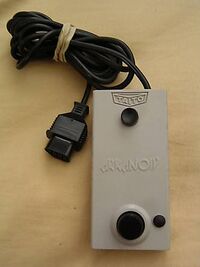
|
Arkanoid/Vaus Controller | A specific game controller with one button to "fire" and a dial to control back-and-forth movement. | Arkanoid Arkanoid: Revenge of Doh Chase H.Q. |
Various | N/A |
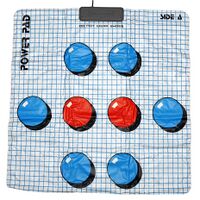 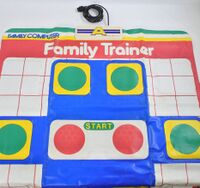 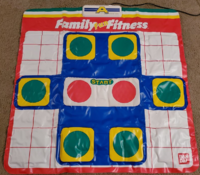 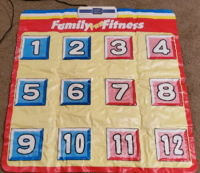
|
Power Pad Family Trainer Family Fun Fitness |
A game controller that allows players to step on a gray floor mat with 12 pressure-sensors embedded between flexible plastic to control gameplay. | Stadium Events Dance Aerobics Athletic World |
FCEUX | N/A |
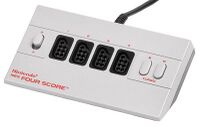 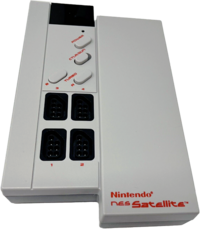
|
NES Four Score NES Satellite 4-Player Adaptor |
A multitap accessory that enables up to 4-player gameplay using infrared wireless communication. | R.C. Pro-Am II Bomberman II[N 1] Gauntlet II Nintendo World Cup A Nightmare on Elm Street |
Various | Emulated by having the option to switch between 2-player and 4-player mode or just enabling/disabling Player 3 and Player 4's controller. |

|
Family Computer Disk System & FDS | See above | Super Mario Bros. 2 Legend of Zelda: The Hyrule Fantasy Zelda II: The Adventure of Link Metroid Light Mythology: Palutena's Mirror Akumajō Dracula Ice Hockey |
Mesen puNES Nestopia UE ares BizHawk Nintendulator NRS FCEumm_libretro FinalBurn_Neo higan MAME iNES Jnes RockNES Others... |
The BIOS file (which can be found here) is required for FDS emulation. Note that there are two versions of the BIOS: one that comes with FDS and another that comes with Sharp's Twin Famicom. They function identically despite showing a different intro during the first boot. |
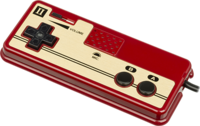
|
Microphone | A Japan-exclusive, built-in feature in the original Player 2 Famicom controller that allows players to use an external sound source (e.g., the player's voice) as input. | Legend of Zelda: The Hyrule Fantasy Light Mythology: Palutena's Mirror Kaiketsu Yanchamaru |
Mesen[N 2] puNES[N 2] VirtuaNES[N 2] Virtual Console[N 3] |
N/A |

|
Family BASIC | A Japan-exclusive peripheral with an enhanced BASIC programming language dialect. It allows users to create programs in the Famicom. It has a specially designed cartridge, keyboard, and Data Recorder. | Family BASIC | Mesen Nestopia UE FCEUX puNES VirtuaNES |
N/A |
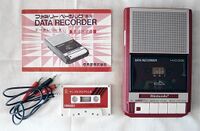
|
Famicom Data Recorder | A Japan-exclusive compact cassette tape data interface as an addition to the Family BASIC to save data from BASIC programs created by users. | Family BASIC | Mesen Nestopia UE puNES VirtuaNES |
N/A |
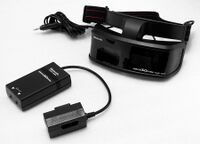
|
Famicom 3D System | A Japan-exclusive active shutter glasses headset that allowed compatible games to display a stereoscopic image for a 3D experience. | Famicom Grand Prix II: 3D Hot Rally Highway Star Falsion |
RetroArch Ares? |
GLSL shaders are needed for RetroArch to simulate the 3D experience with a VR headset, 3D TV, 3D projector or Android phone with cardboard. |

|
Miracle Piano Teaching System | An accessory that used an electronic MIDI keyboard as input. | Miracle Piano Teaching System | MAME no$nes Nintaco FCEUX mod MiSTer |
N/A |
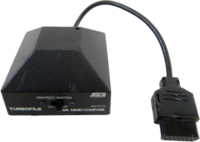 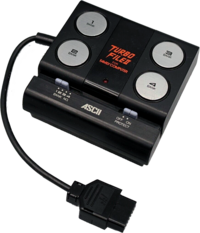
|
ASCII TurboFile ASCII TurboFile II |
A Japan-exclusive external storage device for saving game positions on Famicom. | Wizardry: Proving Grounds of the Mad Overlord Wizardry II: The Knight of Diamonds Downtown Nekketsu Monogatari Haja no Fūin |
VirtuaNES | N/A |
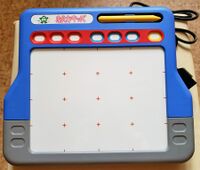
|
Oeka Kids Tablet | A Japan-exclusive drawing tablet for the Famicom Oeka Kids series.[3] | Oeka Kids: Anpanman no Hiragana Daisuki Oeka Kids: Anpanman to Oekaki Shiyou!! |
Mesen Nestopia UE FCEUX puNES VirtuaNES |
N/A |
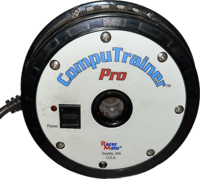
|
RacerMate CompuTrainer Pro | A rare series of peripherals for the game RacerMate Challenge II. It has an interface box, a bike trainer, and a handlebar display.[4] | RacerMate Challenge II | N/A | N/A |
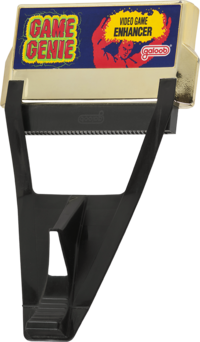
|
Game Genie | A pass-through device that is attached between a cartridge and the console that allows the player to manipulate various aspects of games and access unused assets and functions by temporarily modify game data. | Various | FCEUX[N 4] puNES[N 4] |
Most emulators have a GUI to manage cheats and don't rely on real hardware cheating devices. |

|
Family Computer Network System Famicom Modem |
A Japan-exclusive network peripheral that allowed users to connect to a Nintendo server that provided extra content such as jokes, news, game tips, weather forecasts, horse betting and downloadable content via dial-up modem. | N/A | N/A | N/A |

|
SNES Mouse | There have been quite a few NES romhacks coming out that add support for the SNES mouse to NES games. | Maniac Mansion Mouse Hack | Mesen | There is a feature request for adding this to fceumm-libretro. |